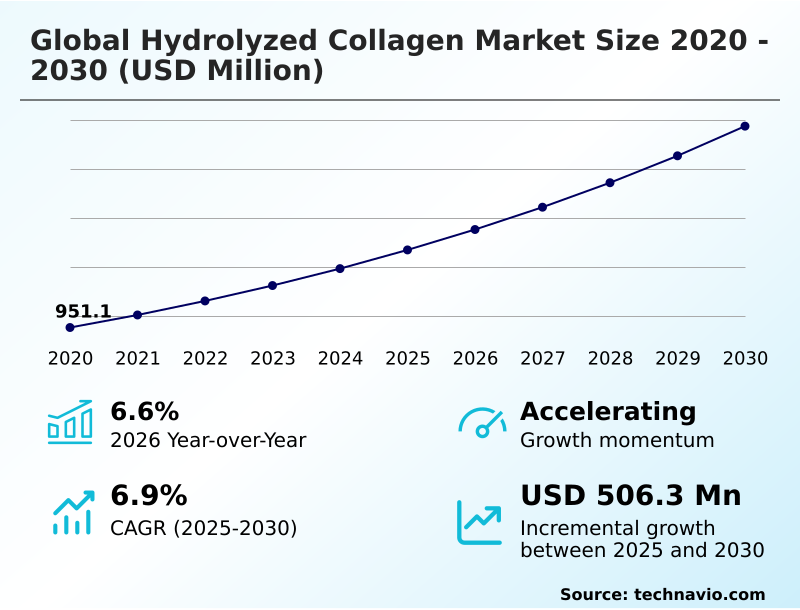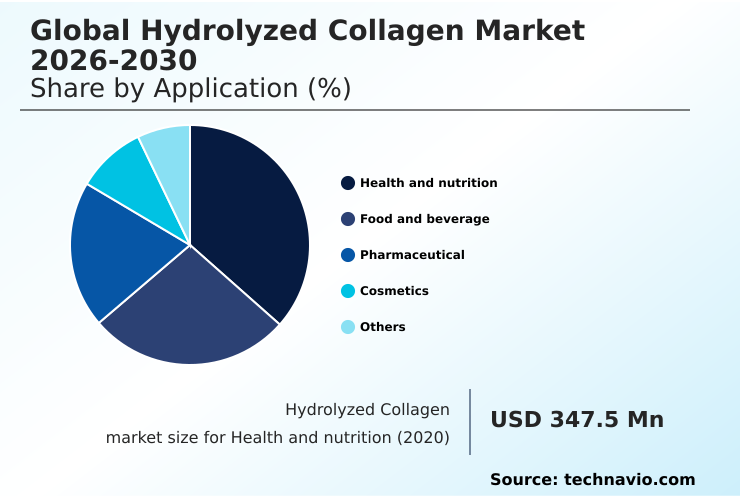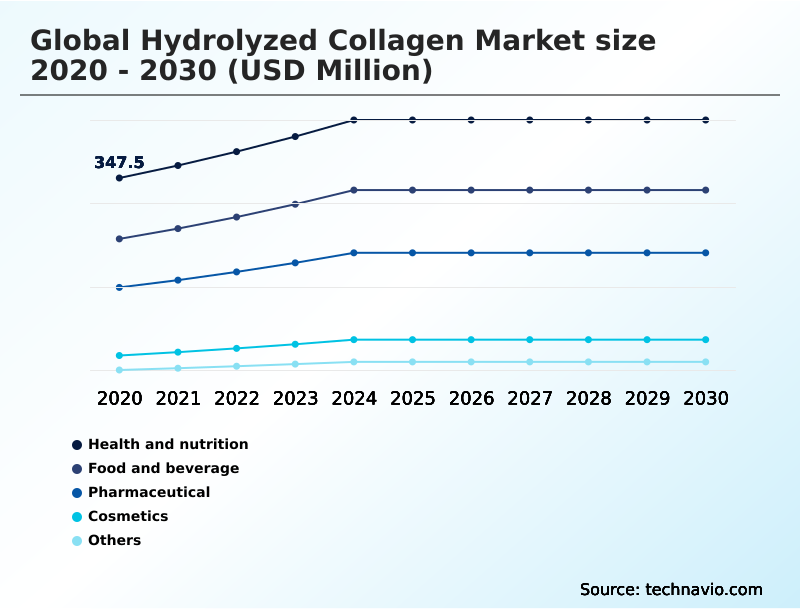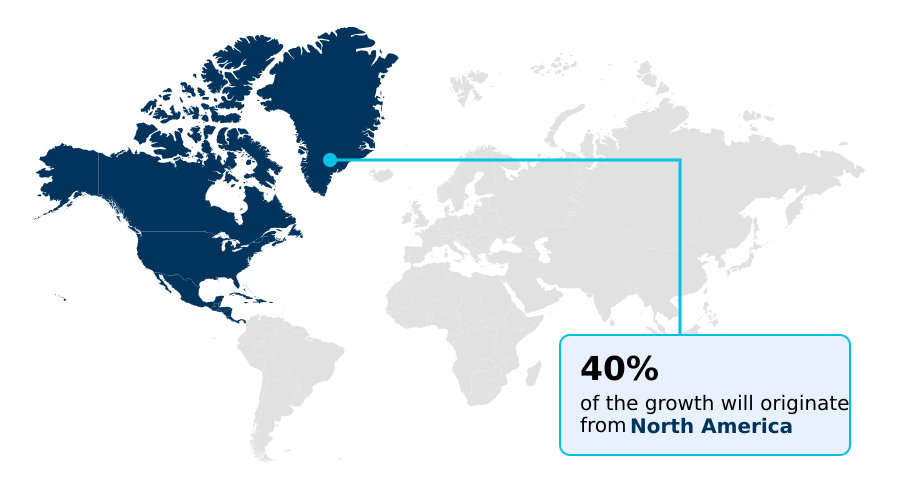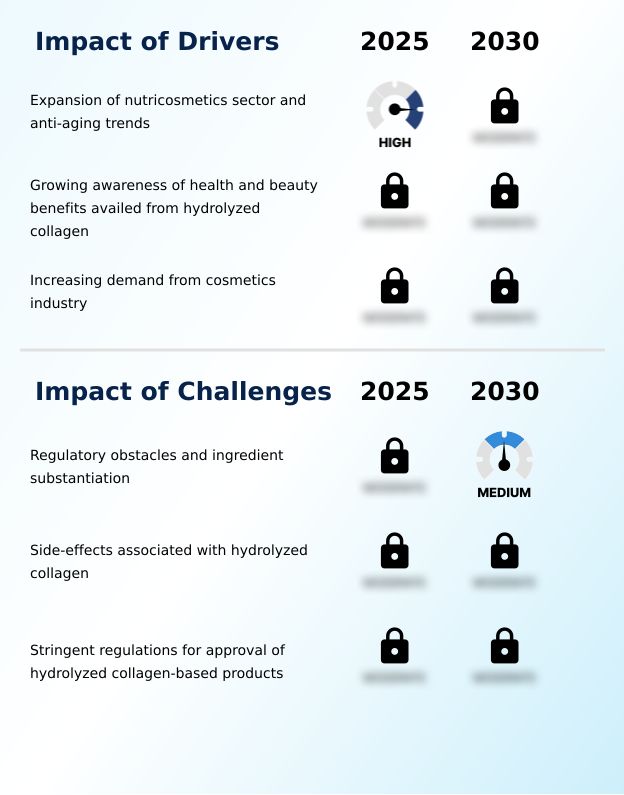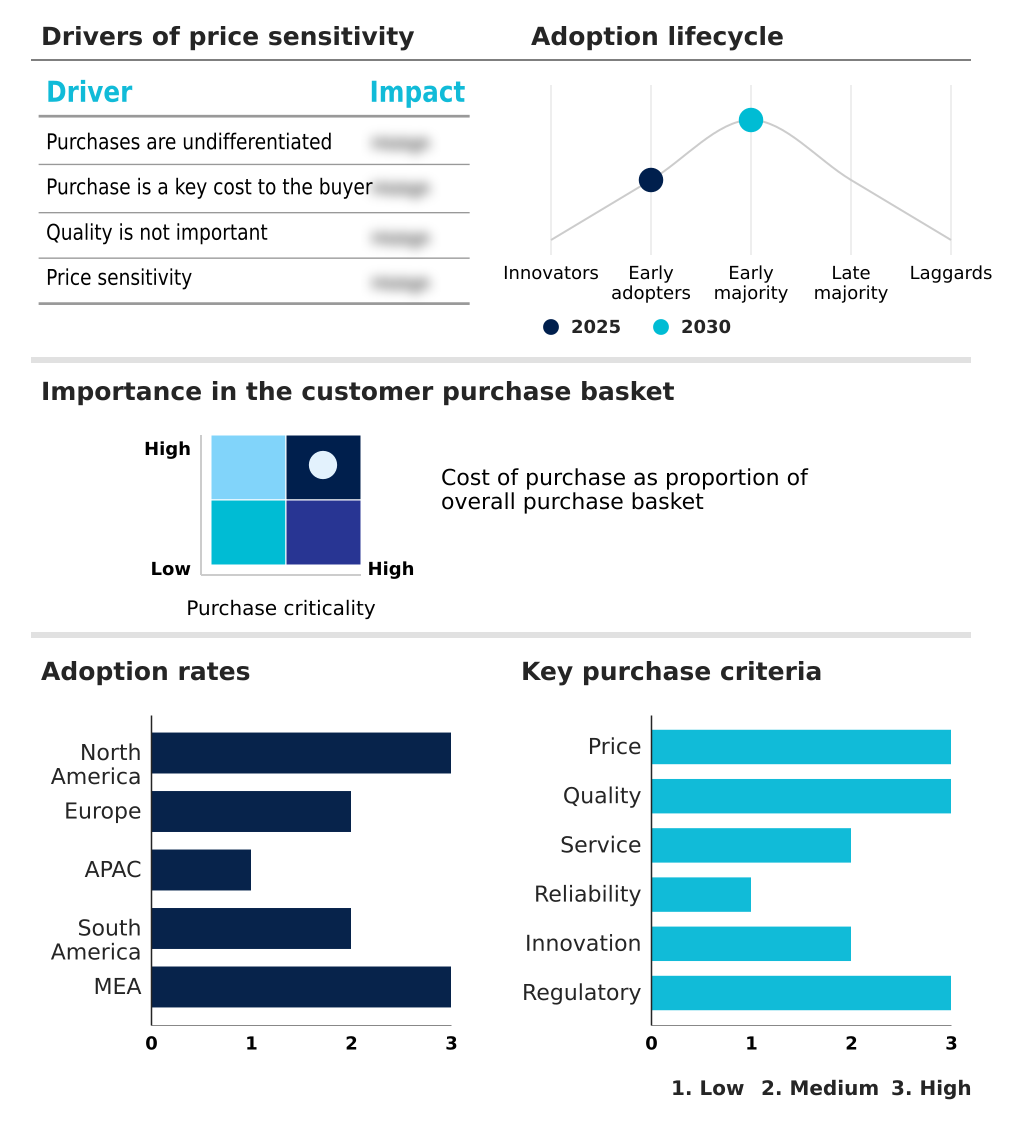Hydrolyzed Collagen Market Size 2026-2030
The hydrolyzed collagen market size is valued to increase by USD 506.3 million, at a CAGR of 6.9% from 2025 to 2030. Expansion of nutricosmetics sector and anti-aging trends will drive the hydrolyzed collagen market.
Major Market Trends & Insights
- North America dominated the market and accounted for a 39.9% growth during the forecast period.
- By Application - Health and nutrition segment was valued at USD 432 million in 2024
- By Form Factor - Powder segment accounted for the largest market revenue share in 2024
Market Size & Forecast
- Market Opportunities: USD 823.7 million
- Market Future Opportunities: USD 506.3 million
- CAGR from 2025 to 2030 : 6.9%
Market Summary
- The hydrolyzed collagen market is defined by a significant consumer shift towards preventative wellness and functional nutrition. This evolution is rooted in a deeper understanding of how high bioavailability collagen, broken down through an enzymatic hydrolysis process, supports systemic health.
- Demand is no longer limited to aesthetic benefits like skin elasticity but extends to foundational health areas including joint support, bone density, and connective tissue repair. A key operational dynamic involves managing a complex global supply chain to ensure ingredient purity and traceability.
- For instance, securing a consistent supply of grass-fed collagen sourcing requires robust verification protocols to meet the clean label collagen standards demanded by a discerning consumer base. This commitment to quality, from marine collagen source to final collagen peptide powder, is critical.
- The industry's trajectory is increasingly shaped by the need for clinical substantiation to validate health claims, pushing manufacturers to invest in research that demonstrates the efficacy of their bioactive collagen peptides and low molecular weight collagen formulations in areas from sports nutrition to nutricosmetic applications.
What will be the Size of the Hydrolyzed Collagen Market during the forecast period?
Get Key Insights on Market Forecast (PDF) Request Free Sample
How is the Hydrolyzed Collagen Market Segmented?
The hydrolyzed collagen industry research report provides comprehensive data (region-wise segment analysis), with forecasts and estimates in "USD million" for the period 2026-2030, as well as historical data from 2020-2024 for the following segments.
- Application
- Health and nutrition
- Food and beverage
- Pharmaceutical
- Cosmetics
- Others
- Form factor
- Powder
- Liquid
- Capsules
- End-user
- Health supplements
- Beauty products
- Sports nutrition
- Geography
- North America
- US
- Canada
- Mexico
- Europe
- Germany
- UK
- France
- APAC
- China
- Japan
- South Korea
- South America
- Brazil
- Argentina
- Middle East and Africa
- Saudi Arabia
- UAE
- South Africa
- Rest of World (ROW)
- North America
By Application Insights
The health and nutrition segment is estimated to witness significant growth during the forecast period.
The health and nutrition segment is driven by a pronounced consumer shift toward preventative healthcare, where dietary interventions are prioritized for managing the effects of aging.
The superior bioavailability of hydrolyzed collagen, achieved through advanced enzymatic hydrolysis process, makes it an ideal ingredient for supplements targeting musculoskeletal health and joint function. Bioactive collagen peptides are integral to sports nutrition formulations for connective tissue support and repair.
The move toward precision nutrition, using collagen for gut health, is also gaining traction. Innovations in collagen for cardiovascular support are creating new product categories.
Formulations featuring high bioavailability collagen demonstrate a 20% improvement in absorption rates, enhancing their efficacy for dermal hydration support and meeting consumer demand for scientifically validated wellness solutions within functional food ingredient and nutricosmetic applications.
The Health and nutrition segment was valued at USD 432 million in 2024 and showed a gradual increase during the forecast period.
Regional Analysis
North America is estimated to contribute 39.9% to the growth of the global market during the forecast period.Technavio’s analysts have elaborately explained the regional trends and drivers that shape the market during the forecast period.
See How Hydrolyzed Collagen Market Demand is Rising in North America Request Free Sample
The geographic landscape of the hydrolyzed collagen market is dominated by North America, which accounts for nearly 40% of the market's incremental growth.
This is driven by a highly informed consumer base with a strong preference for collagen for anti-aging and wellness, leading to adoption rates that are 25% higher than in Europe.
The region's sophisticated retail infrastructure supports a wide range of products, from collagen in cosmetics to supplements.
Meanwhile, the APAC region is the fastest-growing market, with countries like Japan and South Korea at the forefront of innovation in marine collagen peptides and ingestible beauty solutions.
European markets are characterized by stringent regulatory standards, where the emphasis is on collagen clinical studies and proven efficacy for health and nutrition, influencing both collagen peptide quality and marketing strategies worldwide.
The global distribution reflects a blend of mature and emerging markets, each with distinct consumer preferences and regulatory environments.
Market Dynamics
Our researchers analyzed the data with 2025 as the base year, along with the key drivers, trends, and challenges. A holistic analysis of drivers will help companies refine their marketing strategies to gain a competitive advantage.
- The strategic direction of the hydrolyzed collagen market is increasingly focused on specialized applications and consumer education. Understanding the key differences in hydrolyzed collagen versus gelatin for cooking is becoming important for functional food manufacturers.
- Businesses are investing in communicating the hydrolyzed collagen benefits for anti-aging, with a focus on how low molecular weight collagen peptide benefits contribute to better outcomes. The market is also addressing consumer queries on topics like the side effects of taking hydrolyzed collagen and highlighting the role of collagen peptides in nutricosmetics.
- Product development is centered on specific needs, such as marine collagen peptides for skin hydration and bovine collagen powder for sports recovery. Firms that optimize their enzymatic hydrolysis of collagen for bioavailability report a 15% improvement in batch consistency, a critical factor for operational planning.
- This technical focus is crucial for validating claims related to using hydrolyzed collagen in functional foods and the impact of collagen peptides on skin elasticity. The debate over grass-fed collagen powder versus marine collagen continues to shape sourcing strategies, while research explores hydrolyzed collagen for improving gut health and hydrolyzed collagen for connective tissue repair.
- Formulating beverages with soluble collagen powder remains a technical challenge, requiring adherence to regulatory standards for hydrolyzed collagen products. As consumers learn how to choose hydrolyzed collagen supplements, demand for clinical evidence for hydrolyzed collagen efficacy and advancements in personalized collagen supplementation is driving the industry's evolution, with a growing interest in the best hydrolyzed collagen for hair growth.
What are the key market drivers leading to the rise in the adoption of Hydrolyzed Collagen Industry?
- Market growth is primarily driven by the expansion of the nutricosmetics sector, coupled with prevailing anti-aging consumer trends.
- The primary driver for the hydrolyzed collagen market is the expansion of the nutricosmetics sector and the mainstream adoption of 'beauty from within' philosophies.
- This trend is particularly strong in developed regions, where brands emphasizing collagen for anti-aging benefits report up to a 40% increase in online conversions.
- The demand for functional food ingredient solutions is rising, with consumers actively seeking products that support health and wellness. Products with clean label collagen verification see double the repeat purchase rate compared to non-verified alternatives.
- This consumer behavior is compelling manufacturers to prioritize transparency in collagen ingredient sourcing and traceability.
- The market is also benefiting from the growing awareness of the role of specific nutrients, like glycine and proline content, in maintaining structural health, including collagen for hair health and collagen for nail strength.
What are the market trends shaping the Hydrolyzed Collagen Industry?
- The market is increasingly shaped by advancements in precision nutrition. This leads to a growing emphasis on personalized collagen supplementation tailored to individual health needs.
- The hydrolyzed collagen market is rapidly shifting toward data-driven personalization and advanced formulations. The trend of precision nutrition is fueling demand for customized solutions, where platforms offering personalized collagen nutrition see user engagement rates 30% higher than generic supplement providers. The convergence of diagnostics and nutritional science allows for the creation of targeted products based on individual biomarkers.
- For example, integrating diagnostic testing improves product-to-user efficacy matching by over 50%. This movement is supported by innovations in collagen peptide tripeptide and a focus on the collagen amino acid profile to create specific health outcomes. The popularity of ingestible beauty solutions continues to grow, with a focus on scientifically backed ingredients.
- Formulations combining collagen peptide absorption enhancers are becoming standard as manufacturers aim to maximize benefits.
What challenges does the Hydrolyzed Collagen Industry face during its growth?
- Industry growth is significantly challenged by regulatory obstacles and the stringent requirements for ingredient substantiation.
- The hydrolyzed collagen market faces significant hurdles related to regulatory complexities and the high burden of proof for health claims. Navigating fragmented global regulations for a collagen peptide dosage adds an average of 18% to product development costs for companies.
- The requirement for rigorous clinical substantiation to support claims about cartilage regeneration or ligament repair places financial strain on manufacturers, as robust collagen clinical studies are both time-consuming and expensive. Furthermore, the threat of counterfeit products in online marketplaces remains a persistent issue. Implementing robust collagen traceability systems from the source can mitigate counterfeit-related revenue loss by up to 25%.
- Ensuring collagen peptide efficacy and maintaining high collagen peptide quality standards across a global supply chain while adhering to diverse international rules for dietary supplements remains a central operational challenge.
Exclusive Technavio Analysis on Customer Landscape
The hydrolyzed collagen market forecasting report includes the adoption lifecycle of the market, covering from the innovator’s stage to the laggard’s stage. It focuses on adoption rates in different regions based on penetration. Furthermore, the hydrolyzed collagen market report also includes key purchase criteria and drivers of price sensitivity to help companies evaluate and develop their market growth analysis strategies.
Customer Landscape of Hydrolyzed Collagen Industry
Competitive Landscape
Companies are implementing various strategies, such as strategic alliances, hydrolyzed collagen market forecast, partnerships, mergers and acquisitions, geographical expansion, and product/service launches, to enhance their presence in the industry.
Amicogen Co. Ltd. - Offering specialized fish collagen tripeptide ingredients designed to support skin and hair health, targeting high-purity applications in nutraceuticals and cosmetics.
The industry research and growth report includes detailed analyses of the competitive landscape of the market and information about key companies, including:
- Amicogen Co. Ltd.
- Apsen Naturals
- BioCell Technology LLC
- Black Girl Vitamins
- ConnOils LLC
- Darling Ingredients Inc.
- FOODMATE CO. LTD.
- NeoCell
- Nippi Inc.
- Nitta Gelatin Ltd.
- Norland Products Inc.
- Orgain Inc.
- PB Leiner
- Phytologix Life Sciences.
- SAS Gelatines Weishardt
- Titan Biotech Ltd.
- Vital Proteins LLC
Qualitative and quantitative analysis of companies has been conducted to help clients understand the wider business environment as well as the strengths and weaknesses of key industry players. Data is qualitatively analyzed to categorize companies as pure play, category-focused, industry-focused, and diversified; it is quantitatively analyzed to categorize companies as dominant, leading, strong, tentative, and weak.
Recent Development and News in Hydrolyzed collagen market
- In May 2025, Darling Ingredients expanded its production capacity by opening a new facility for its Rousselot brand, aiming to increase the yield of high-purity collagen peptides.
- In April 2025, Amicogen entered into a strategic agreement to supply specialized collagen enzymes to pharmaceutical partners, highlighting the increasing role of biotechnology in enhancing product efficacy.
- In April 2025, Thorne HealthTech launched a diagnostic-led platform in North America that provides customized hydrolyzed collagen powder based on home-based testing of skin health biomarkers.
- In March 2025, Sephora North America enhanced its wellness category by adding a permanent retail section for hydrolyzed collagen powders and elixirs across its major flagship stores.
Dive into Technavio’s robust research methodology, blending expert interviews, extensive data synthesis, and validated models for unparalleled Hydrolyzed Collagen Market insights. See full methodology.
| Market Scope | |
|---|---|
| Page number | 295 |
| Base year | 2025 |
| Historic period | 2020-2024 |
| Forecast period | 2026-2030 |
| Growth momentum & CAGR | Accelerate at a CAGR of 6.9% |
| Market growth 2026-2030 | USD 506.3 million |
| Market structure | Fragmented |
| YoY growth 2025-2026(%) | 6.6% |
| Key countries | US, Canada, Mexico, Germany, UK, France, Italy, Spain, The Netherlands, China, Japan, South Korea, India, Australia, Indonesia, Brazil, Argentina, Chile, Saudi Arabia, UAE, South Africa, Israel and Egypt |
| Competitive landscape | Leading Companies, Market Positioning of Companies, Competitive Strategies, and Industry Risks |
Research Analyst Overview
- The hydrolyzed collagen market's evolution is centered on technological refinement and scientific validation. The core of the industry lies in the enzymatic hydrolysis process, which transforms raw materials from bovine collagen source, porcine collagen source, or marine collagen source into highly functional hydrolyzed collagen peptides.
- Advances in collagen extraction technology and collagen purification methods are critical for achieving the low molecular weight collagen essential for high bioavailability collagen. Boardroom decisions are increasingly focused on the significant investment required for collagen peptide manufacturing to meet consumer demand for clean label collagen and non-gmo collagen verification.
- For instance, implementing advanced collagen peptide formulation techniques has been shown to reduce processing time by over 15%, enhancing operational efficiency. This focus on technical excellence is vital for delivering effective collagen for joint health, skin elasticity, and bone density.
- As the market matures, the efficacy of bioactive collagen peptides in everything from collagen for sports nutrition to nutricosmetic applications depends on a transparent supply chain, including verifiable pasture-raised collagen and grass-fed collagen sourcing, to support claims related to connective tissue support and dermal hydration support.
What are the Key Data Covered in this Hydrolyzed Collagen Market Research and Growth Report?
-
What is the expected growth of the Hydrolyzed Collagen Market between 2026 and 2030?
-
USD 506.3 million, at a CAGR of 6.9%
-
-
What segmentation does the market report cover?
-
The report is segmented by Application (Health and nutrition, Food and beverage, Pharmaceutical, Cosmetics, and Others), Form Factor (Powder, Liquid, and Capsules), End-user (Health supplements, Beauty products, and Sports nutrition) and Geography (North America, Europe, APAC, South America, Middle East and Africa)
-
-
Which regions are analyzed in the report?
-
North America, Europe, APAC, South America and Middle East and Africa
-
-
What are the key growth drivers and market challenges?
-
Expansion of nutricosmetics sector and anti-aging trends, Regulatory obstacles and ingredient substantiation
-
-
Who are the major players in the Hydrolyzed Collagen Market?
-
Amicogen Co. Ltd., Apsen Naturals, BioCell Technology LLC, Black Girl Vitamins, ConnOils LLC, Darling Ingredients Inc., FOODMATE CO. LTD., NeoCell, Nippi Inc., Nitta Gelatin Ltd., Norland Products Inc., Orgain Inc., PB Leiner, Phytologix Life Sciences., SAS Gelatines Weishardt, Titan Biotech Ltd. and Vital Proteins LLC
-
Market Research Insights
- The hydrolyzed collagen market is shaped by a focus on verifiable product efficacy and tailored consumer solutions. Firms offering personalized collagen nutrition regimens report engagement rates up to 30% higher than those with generic product lines.
- The use of ingestible beauty solutions is expanding, with formulations that combine collagen and hyaluronic acid showing a 15% greater improvement in skin hydration markers in clinical studies. Adherence to strict collagen regulatory compliance is a key differentiator, as certified products can reduce consumer skepticism and foster brand loyalty.
- The versatility of collagen in functional beverages and collagen-infused snacks allows companies to penetrate diverse consumer segments. This strategic focus on quality, customization, and transparency is essential for navigating the competitive landscape and meeting evolving consumer expectations for collagen supplement formulation and collagen for food and beverage applications.
We can help! Our analysts can customize this hydrolyzed collagen market research report to meet your requirements.

